ML Aggarwal Class 6 Solutions Chapter 1 Knowing Our Numbers Objective Type Questions for ICSE Understanding Mathematics acts as the best resource during your learning and helps you score well in your exams.
ML Aggarwal Class 6 Solutions for ICSE Maths Chapter 1 Knowing Our Numbers Objective Type Questions
Mental Maths
Question 1.
Fill in the blanks:
(i) The digit …………… has the highest place value in the number 2309.
(ii) The digit …………… has the highest face value in the number 2039.
(iii) The digit …………… has the lowest place value in the number 2039.
(iv) Both Indian and International systems of numeration have …………… period in common.
(v) In the International system of numeration, commas are placed from …………… after every …………… digits.
(vi) The bigger number from the numbers 57,631 and 57,361 is ……………
(vii) 1 crore = …………… million
(viii)The smallest 4-digit number with 3 different digits is ……………
(ix) The greatest 4-digit number with 3 different digits is ……………
(x) 15 km 300 m = …………… m
(xi) 7850 cm = …………… m …………… cm
(xii) The number 5079 when estimated to the nearest hundreds is ……………
Solution:
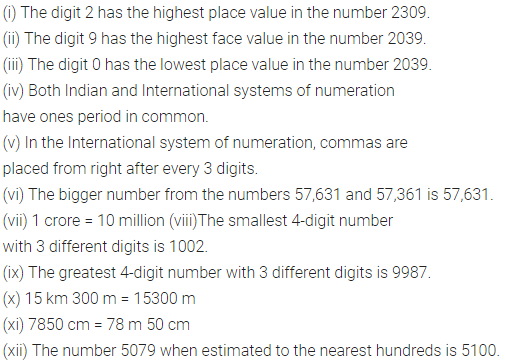
Question 2.
State whether the following statements are true (T) or false (F):
(i) The difference between the place value and the face of the digit 7 in the number 2701 is 693.
(ii) The smallest 4-digit number -1 = the greatest 3-digit number.
(iii) The place of a digit is independent of whether the number is written in the Indian system or International system of numeration.
(iv) In the International system, a number having less number of digits is always smaller than the number having more number of digits.
(v) The estimated value of 9999 to the nearest tens is 10000.
Solution:
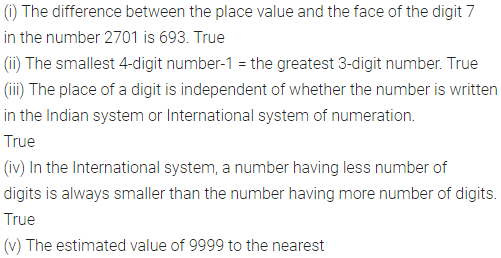
Multiple Choice Questions
Choose the correct answer from the given four options (3 to 17):
Question 3.
The face value of the digit 5 in the number 36503 is
(a) 5
(b) 503
(c) 500
(d) none of these
Solution:
![]()
Question 4.
The difference between the place values of 6 and 3 in 76834 is
(a) 3
(b) 5700
(c) 5930
(d) 5970
Solution:

Question 5.
The sum of the place values of all the digits in 5003 is
(a) 8
(b) 53
(c) 5003
(d) 8000
Solution:
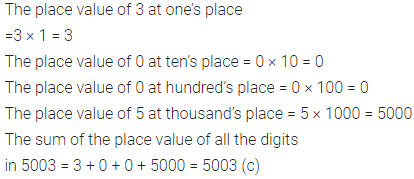
Question 6.
The total number of 4-digit numbers is
(a) 9000
(b) 9999
(c) 10000
(d) none of these
Solution:

Question 7.
The product of the place values of two-threes in 73532 is
(a) 9000
(b) 90000
(c) 99000
(d) 1000
Solution:

Question 8.
The smallest 4-digit number having distinct digits is
(a) 1234
(b) 1023
(c) 1002
(d) 3210
Solution:
![]()
Question 9.
The largest 4-digit number having distinct digits is
(a) 9999
(b) 9867
(c) 9786
(d) 9876
Solution:
![]()
Question 10.
The largest 4-digit number is
(a) 9999
(b) 9876
(c) 9990
(d) none of these
Solution:
![]()
Question 11.
The difference between the largest number of 3-digit and the largest number of 3-digit with distinct digits is
(a) 0
(b) 10
(c) 12
(d) 14
Solution:

Question 12.
If we write natural numbers from 1 to 100, the number of times the digit 5 has been written is
(a) 11
(b) 15
(c) 19
(d) 20
Solution:

Question 13.
The number 28,549 when rounded off to the nearest hundreds is
(a) 28,000
(b) 28,500
(c) 28,600
(d) 29,000
Solution:

Question 14.
The smallest natural number which when rounded off to the nearest hundreds as 500 is
(a) 499
(b) 501
(c) 450
(d) 549
Solution:

Question 15.
The greatest natural number which when rounded off to the nearest hundreds as 500 is
(a) 549
(b) 599
(c) 450
(d) none of these
Solution:

Question 16.
The greatest 5-digit number formed by the digits 3, 0, 7 is
(a) 33077
(b) 77730
(c) 77330
(d) none of these
Solution:
![]()
Question 17.
In the International place value system, we write 1 billion for
(a) 10 lakh
(b) 1 crore
(c) 10 crore
(d) 100 crore
Solution:
![]()
Value Based Questions
Question 1.
The distance between Anu’s home and her school is 4 km 850 m. Everyday she cycles both ways. Find the distance covered by her in a week. (Sunday being a holiday).
What are the advantages of cycling?
Solution:
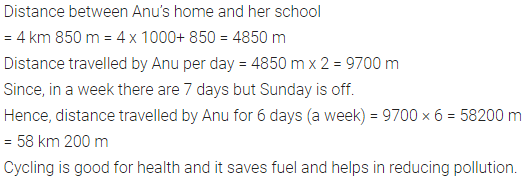
Higher Order Thinking Skills (HOTS)
Question 1.
Is there any digit whose place value is always equal to its face value irrespective of its position in any number?
Solution:
![]()
Question 2.
Write all 4-digit numbers that can be formed with the digits2 and 5, using both digits equal number of time. Also find their sum.
Solution:
![]()
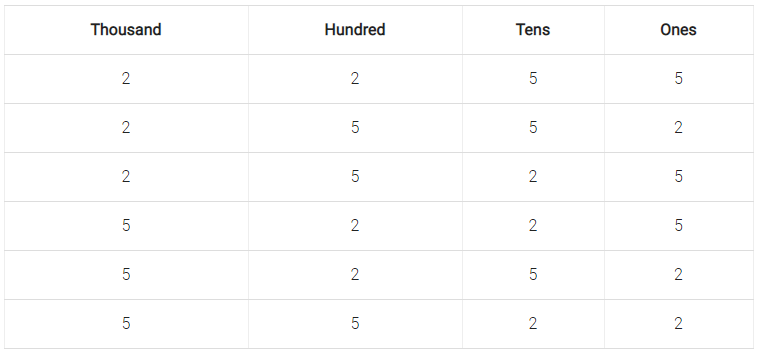
Question 3.
What is the difference between the smallest 6-digit number with five different digits and the greatest 5-digit number with four different digits?
Solution:

Question 4.
How many times does the digit 3 occur at tert’s place in natural numbers from 100 to 1000?
Solution:
![]()